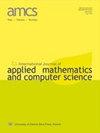雾计算中时变多维资源分配与定价的组合拍卖机制
IF 1.2
4区 计算机科学
Q3 AUTOMATION & CONTROL SYSTEMS
International Journal of Applied Mathematics and Computer Science
Pub Date : 2023-06-01
DOI:10.34768/amcs-2023-0024
引用次数: 0
摘要
摘要研究雾计算中的资源分配是一个热点问题。但是,目前雾计算中的资源分配大多只支持固定资源,即在使用时间内用固定的资源满足用户的资源需求,这可能导致资源提供者的效用较低,甚至造成资源的浪费。为此,我们针对雾计算中时变多维资源分配问题建立了整数规划模型,以实现雾资源池的最大利用率。我们还设计了一种启发式算法来逼近模型的解。我们采用基于优势资源的资源分配策略来提高资源利用率,并采用临界价值理论来提高雾资源池的效用。我们还证明了该算法满足真实合理性和个体合理性。最后,给出了一些数值算例来验证算法的性能。与现有研究相比,我们的方法可以提高资源利用率,最大限度地利用雾资源池。本文章由计算机程序翻译,如有差异,请以英文原文为准。
A Combinatorial Auction Mechanism for Time–Varying Multidimensional Resource Allocation and Pricing in Fog Computing
Abstract It is a hot topic to investigate resource allocation in fog computing. However, currently resource allocation in fog computing mostly supports only fixed resources, that is, the resource requirements of users are satisfied with a fixed amount of resources during the usage time, which may result in low utility of resource providers and even cause a waste of resources. Therefore, we establish an integer programming model for the time-varying multidimensional resource allocation problem in fog computing to maximize the utility of the fog resource pool. We also design a heuristic algorithm to approximate the solution of the model. We apply a dominant-resource-based strategy for resource allocation to improve resource utilization as well as critical value theory for resource pricing to enhance the utility of the fog resource pool. We also prove that the algorithm satisfies truthful and individual rationality. Finally, we give some numerical examples to demonstrate the performance of the algorithm. Compared with existing studies, our approach can improve resource utilization and maximize the utility of the fog resource pool.
求助全文
通过发布文献求助,成功后即可免费获取论文全文。
去求助
来源期刊
CiteScore
4.10
自引率
21.10%
发文量
0
审稿时长
4.2 months
期刊介绍:
The International Journal of Applied Mathematics and Computer Science is a quarterly published in Poland since 1991 by the University of Zielona Góra in partnership with De Gruyter Poland (Sciendo) and Lubuskie Scientific Society, under the auspices of the Committee on Automatic Control and Robotics of the Polish Academy of Sciences.
The journal strives to meet the demand for the presentation of interdisciplinary research in various fields related to control theory, applied mathematics, scientific computing and computer science. In particular, it publishes high quality original research results in the following areas:
-modern control theory and practice-
artificial intelligence methods and their applications-
applied mathematics and mathematical optimisation techniques-
mathematical methods in engineering, computer science, and biology.

 求助内容:
求助内容: 应助结果提醒方式:
应助结果提醒方式:


